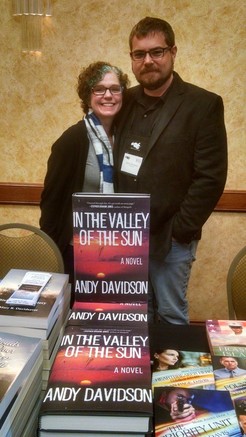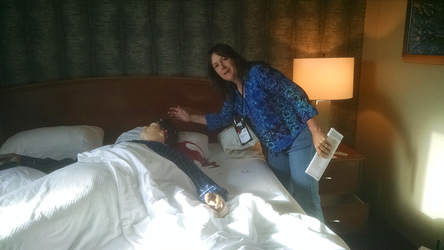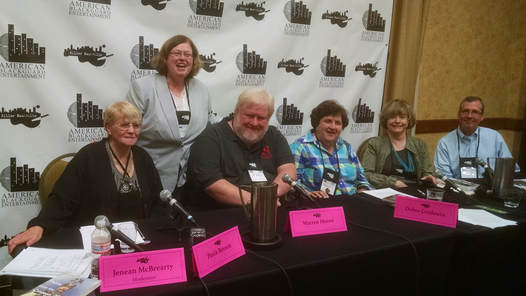 Crystal and Andy Davidson Crystal and Andy Davidson I continue my adventures at Killer Nashville 2017. Lunch was provided by the conference, which saved attendees from added expense, and time spent hunting down a restaurant. It also offered more networking time, as writers chatted about the craft, the conference, and life in general. 12:00 Friday August 25 - Interview with Chris Grabenstein After lunch, conference chair Clay Stafford interviewed middle grade author Chris Grabenstein. Chris advised writers to say yes to unexpected opportunities. Grabenstein told us that three of his readers’ favorite words are poop, fart and underpants. He clearly knows his reading audience, and had this banquet room full of authors laughing and applauding. Writing Tip: “We all start out imitating people we like,” Grabenstein said. He advised we “find a voice.” A first person narrator demands a strong voice, so writing in first person is a good way to discover your writing voice. Strong voice is key to succeeding in fiction writing.  1:20 Friday August 25 – Crime Scene After the interview, I went to Room 224, the Killer Nashville Crime Scene. A hotel room was converted to a realistic crime scene, with clues and red herrings sprinkled throughout. I worked my way through the living area, to the bathroom, and finally to the bedroom, where a realistic corpse reclined in bed, his head resting on a blood-soaked pillow from the fatal gunshot to his head. Participants were given a clue sheet and a spreadsheet to mark for forensics testing. The clue sheet told us how to access interviews with witnesses and suspects. The point of the exercise was to solve the crime and win attendance at KN 2018, but the more important point was teaching participants about crime scene investigation. Everything looked like a clue, including a single Coke can among the case of Pepsi cans, a clearly ridiculous suicide note, fast food receipts, and a condom floating in the toilet. I viewed the interviews online later while my husband toured of the Jack Daniels distillery. I narrowed down the suspects, but was not 100% certain who did it. I gained a deeper respect for the difficulty law enforcement has winnowing fact from fiction. The solution had to wait for Saturday.  l-r: Jenean McBrearty, Paula Benson, Warren Moore, Debra Goldstein, Kathryn Lane, Bob Mangeot l-r: Jenean McBrearty, Paula Benson, Warren Moore, Debra Goldstein, Kathryn Lane, Bob Mangeot 2:20 Friday August 25 – You’ve Got 5,000 Words: How to Write Short Stories I was eager to hear from some of my favorite short story authors, many appearing in Alfred Hitchcock Mystery Magazine. Moderator Jenean McBrearty told the audience that the internet is insatiable. Short story outlets are in constant need of material. Paula Benson emphasized the importance of short stories, pointing out that being published in short fiction is a publishing credit, and a short fiction category is included on many awards ballots. Debra Goldstein strongly recommended following directions for word count and subject matter when you’re submitting. Warren Moore said short fiction may not be financially rewarding, but finds that liberating – he has the freedom to write what he wants the way he wants. Kathryn Lane believes creativity is important, but writers need discipline to write the story. Bob Mangeot writes short stories exclusively. He cautions that the short story is its own specific form, distinct from the novel. He believes a short story should be written in one sitting, and contain one thread designed for “a big honking moment.” When asked to name their favorite short stories, both Paula and Debra listed B. K. Stevens among their favorite authors, for Thea’s First Husband and The Last Blue Glass. Bob listed Edgar Allen Poe’s The Cask of Amontillado and Flannery O’Connor’s A Good Man is Hard to Find. Kathryn listed Jorge Luis Borges as a favorite short fiction author, with The Garden of Forking Paths being on her list as well as on Warren’s. Kathryn listed Poe’s Murder in the Rouge Morgue, while Warren added Chaucer’s The Pardoner’s Tale and Harlan Ellison’s "Repent, Harlequin!" Said the Ticktockman. Here are the panelist's rapid-fire responses to how they define characters quickly in short fiction: Paula – Listened to and imitated dialogue from the senate floor for characters in similar roles in her fiction. Warren – through action. Debra – through dialogue or a sharp sentence. Kathryn – in the opening paragraph, with vivid character description. Bob – let the actors start acting and get out of their way; in the opening paragraph, give them a problem. After this panel, I went to my room to view the Crime Scene interviews. My husband returned from Jack Daniels with an exciting report on the history of the distillery, plus bottles of the product to sample. Worn out from a busy day, and with my head filled to bursting with new ideas and information, I turned in for the night. My report on Killer Nashville continues next Tuesday, with Day Two. #KillerNashville2017
0 Comments
Your comment will be posted after it is approved.
Leave a Reply. |
Subscribe to this blog: |
Proudly powered by Weebly
 RSS Feed
RSS Feed